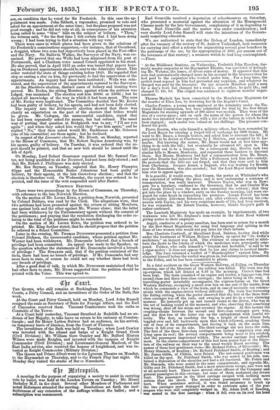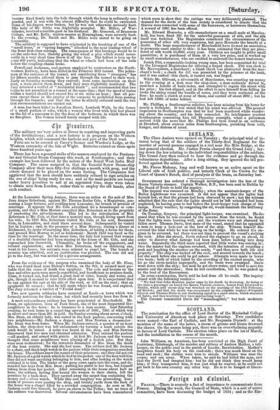tt Yartrufulis.
A meeting for the purpose of organizing a society to assist in carrying vote by ballot, was held at the London Tavern on Tuesday ; Mr. Henry Berkeley M.P. in the chair. Several other Members of Parliament and noted Reformers attended the meeting. Resolutions set forth the inef- fectiveness of any extension of the suffrage without the ballot ; and a subscription was commenced. Earl Granville received a deputation of schoolmasters on Saturday, who presented a memorial against the alteration of the Management Clauses made by the late Government, complaining of it as degrading to them. Earl Granville said the matter was under consideration ; and very shortly Lord John Russell will state the intentions of the Govern- ment respecting education.
We are authorized to state that the Bishop of London, immediately after the vacancy of the rectory of St. Andrew Undershaft, took measures for carrying into effect a scheme for augmenting several poor benefices in the patronage of the see, by the appropriation of 500/. per annum out of the revenues of that rectory ; a measure which he had long contemplated. —Times.
• At the Middlesex Sessions, on Wednesday, Frederick John llaselton, for- merly master carpenter at the Haymarket Theatre, was convicted of defraud- ing Mr. Webster, the lessee, of divers sums of money. It appeared that this man had systematically charged more in his account to the treasurer than he had paid to the carpenters who worked under him. For a long time, the perfect trust reposed in him had prevented any suspicion, and whatever he charged was paid by the treasurer. On one occasion Haselton paid a man for a day's work but charged for a week's ; on another, he paid 18s., and charged 1/. 16s. 8c/. The culprit was sentenced to eighteen months' impri- sonment.
Thomas Mackett has been committed by the Marylebone Magistrate for the murder of Eliza Lea, by drowning her in the Regent's Canal.
Charles Forster, a young man employed at the Admiralty under the Na- tional Medal Commission, has been committed for trial by the Bow Street Magistrate for stealing upwards of 200 silver war-medals. They were of the size of a crown-piece ; and on each the name of the person for whom the medal was intended was engraved. with a list of the battles in which he had been engaged ; each medal was valued at ten shillings. The prisoner con- fessed his guilt.
Pierre Brostin, who calls himself a military officer, has been remanded by the Lord Mayor for uttering a forged bill of exchange for 5000 francs. He went to Mr. Bauer, a foreign banker, and asked him to discount the bill ,• it purported to be drawn at Cherbourg, by J. Matrieu, and accepted by G. La- mache. Not knowing the names, Mr. Bauer would not at first have any- thing to do with the bill ; but eventually he advanced 40/. upon it The bill turned out to be a forgery. On a subsequent day, Brostin took two similar bills to Messrs. Monteaux, and requested those bankers to discount them. But Messrs. Monteaux had had a communication from Mr. Bauer, and after Brostin had indorsed the bills a Policeman took him into custody. He protests that the bills are not forged, and that they were sent to him from Cherbourg. Jacques Annet, a linguist, who was waiting for Breslin near the Monument, was also arrested ; but the Lord Mayor merely bound him over to appear again.
It is possible, it would seem, that Cooper, the porter at Whittaker's who was convicted of robbing the place, and is now undergoing a sentence of transportation, was really innocent. Thomas Taylor, who was in New- gate for a burglary, confessed to the Governor, that he and Charles Win and Joseph Powell were the men who committed the robbery ; that they got into the place by a window, early on the Sunday morning, and were en- gaged for seine hours in ransacking the premises. Joseph Powell has been brought before Alderman &lemons; and, after evidence showing his con- nexion with Taylor, and his very suspicious mode of life, had been received, he was remanded. Sir Robert Carden, however, thinks Cooper's guilt is rather confirmed.
The Lambeth Magistrate has made an example, by imprisonment, of two workmen who left Mr. England's iron-works in the Kent Road without giving notice to their employer.
Argyll, conductor of a penny omnibus, has been sent to prison for a month by the Bow Street Magistrate for using foul language and spitting in the faces of two women who would not pay fares for their infante.
Mrs. Charlotte Cardwell, of Shrubland Road, Dalston, having died while under the treatment of William Hobson Palmer, an agent for "Dr. Coffin's medicines," an inquest was held. The evidence of surgeons went to attri- bute the death to the lobelia of which the medicines were principally com- posed. Palmer, who calls himself a "botanist and herbalist," is said to be a cigar-maker : it does not appear that he has any claims to medical know- ledge. The Jury returned a verdict of "Manslaughter" against, him. He absented himself before the verdict was given in, but subsequently surrendered to the Police, and he has been committed to prison.
In a fatal accident on the Great Western Railway, at Ealing, on Thursday morning, one of the Directors of the railway was killed. The train was the up-express, which left Bristol at 8.10 in the morning. Correct time had. been kept. The train consisted of an engine and tender, a luggage-van, two second-class and three first-class carriages ; the latter being in the rear. A travelling-porter invariably accompanies the express-trains on the Great Western Railway, occupying a small iron box on one end of the tender, from which he commands a view of the train, and in case of necessity can commu- nicate with the engine-driver without difficulty. The train was traversing the Ealing cutting, when the porter observed that the first of the three first- class carriages was off the rails, and swaying to and fro in a very alarming manner. He instantly got up and turned round to the driver, who was in the act of looking round at the moment, and who, observing that something was wrong, shut off his steam and reversed the engine. At this instant the coupling-chains between the second and first-class carriages gave way, and the first two of the latter ran up the embankment with fearful ve- locity. The first, on reaching the top, a height of about fifteen feet, toppled over and fell backwards upon that which followed, crushing three out of four of its compartments, and forcing it back on the main line, where it fell over on its side. The third carriage did not leave the rails. The first of the three first-class carriages was turned completely over and lying upon its roof; the several compartments being more or less crushed, and the passengers imprisoned within. The second carriage had suffered most In the centre compartment of this had been seated four of the Direc- tors of the railway on their way to the usual weekly Board meeting. The names of these four gentlemen were—Mr. Richard Potter, of Gloucester ; Mr. Henry Simonds, of Reading ; Dr. Richard Pritchard Smith, of Reading, and Mr. James Gibbs, of Clifton, near Bristol. The last-named gentleman WU killed on the spot Dr. Pritchard Smith, who was seated by his side, Eus- tamed a dislocation of the shoulder and had a rib fractured. Mr. Potter and Mr. Simonds, who were seated in the same compartment, and opposite Mr. Gibbs and Dr. Pritchard Smith, had a most miraculous escape, and were not at all seriously hurt. There were several other officers of tla.e Company and. general passengers in this carriage, but none of them sustained any severe hurt. The passengers in the third carnage escaped with nothnag more serious than the shock. The second-class passengers were quite un- hurt. When assistance arrived, it was found necessary to break up the two carriages most damaged in order to extricate some of the pas- sengers who were still completely wedged in. Mr. Adam Duff, of Reading, was seated in the first carriage : when it fell over on its roof his head
became fixed firmly into the hole through which the lamp is ordinarily sus- pended, and it was with the utmost difficulty that he could be extricated. Some of his fingers were broken, but he was not otherwise seriously hurt. The body of Mr. Gibbs was frightfully mangled. Mr. Miller, of War- minster, received a terrible gash in his forehead. Mr. Ormerod, of Brazenose College, and Mr. Kelly, station-master at Birmingham, were severely: hurt. In the evening, Dr. Smith and Mr. Miller were stated to be going on favourably.
The accident is supposed to have originated in the breaking of one of the "scroll irons," or • spring hangers," attached to the near leading-wheel of the front first-class carriage. The consequence of this breakage would be to set the axle-box free, thereby giving the wheel a play which would neces- sarily in a very short time throw it off the line. The ballast is torn up for some 400 yards, indicating that the wheel or wheels had been off the rails before the coupling-chains broke.
Powell and Anderson, coal-porters employed by contractors on the North- western Railway, have been killed in the Primrose Hill tunnel. The police- man at the entrance of the tunnel, not considering them "strangers," has for fifteen months allowed them to pass through the tunnel to their work. Early on Saturday morning they entered; from some inattention on their part, a train struck them down, and they were frightfully mutilated. The Jury returned a verdict of "Accidental death" ; and recommended that two trams be not permitted in a tunnel at the same time ; that the speed of trains within a tunnel should not exceed five or six miles an hour ; that all per- sons except those in the employ of the company be prohibited from passing through the tunnels ; and that the latter be strictly enforced untilthe two first recommendations are carried out.
A man has been killed in Jonathan Street, Lambeth Walk, by the fumes of a small portion of coke, which a woman who lived with him had placed on the lid of a saucepan to dry the floor of the bedroom, in which there was no fire-place. The woman herself barely escaped with life.



























 Previous page
Previous page